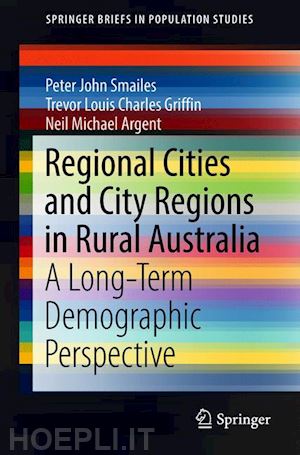
Questo prodotto usufruisce delle SPEDIZIONI GRATIS
selezionando l'opzione Corriere Veloce in fase di ordine.
Pagabile anche con Carta della cultura giovani e del merito, 18App Bonus Cultura e Carta del Docente
The book examines the extent to which the sustained population growth of Australia’s heartland regional centres has come at the expense of demographic decline in their own hinterlands, and, ultimately, of their entire regions. It presents a longitudinal study, over the period 1947-2011, of the extensive functional regions centred on six rapidly growing non-metropolitan cities in south-eastern Australia, emphasising rapid change since 1981. The selected cities are dominantly service centres in either inland or remote coastal agricultural settings. The book shows how intensified age-specific migration and structural ageing arising from macro-economic reforms in the 1980s fundamentally changed the economic and demographic landscapes of the case study regions. It traces the demographic consequences of the change from a relative balance between central city, minor urban centres and dispersed rural population within each functional region in 1947, to one of extremecentral city dominance by 2011, and examines the long-term implications of these changes for regional policy. The book constitutes the first in-depth longitudinal study over the entire post-WWII period of a varied group of Australian regional cities and their hinterlands, defined in terms of functional regions. It employs a novel set of indices which combine numerical and visual expression to measure the structural ageing process.
Chapter 1. Introduction.- Chapter 2. The six centres and their regions.- Chapter 3. Overview of total population change, 1947-2011.- Chapter 4. Economic, environmental and demographic change, 1981-2011.- Chapter 5. Structural ageing and long-term survival 1: major drivers of ageing.- Chapter 6. Structural ageing and long-term survival 2: measures, processes, status .- Chapter 7. A downward demographic spiral: predictable and inexorable?.- Chapter 8. Stop press: some indications from the 2016 Census.- Chapter 9. A summary of findings and their wider applicability.- Chapter 10. Implications for regional research and development I: three key research fields.- Chapter 11. Implications for regional research and development II: Australian regional policy.- Chapter 12. Some final observations.
Dr. Neil Argent is Professor in Human Geography in the Division of Geography and Planning at the University of New England. Neil’s research has broadly focussed on the geography of rural economic, demographic and social change in developed world nations. Via a series of Australian Research Council Discovery-Project grants he has helped demonstrate the impact of financial sector restructuring on rural town economies, the relative importance of population density in influencing the demographic and economic characteristics of rural communities, the role of amenity as a driver of inter-regional migration into rural areas, and the dimensions, causes and implications of youth migration for sending regions and localities. With the co-authors of the proposed volume, Neil has investigated the processes underlying demographic decline and numerical and structural ageing across the rural regions of south-eastern Australia. He is also currently exploring the extent to which mineral and energy royalty schemes facilitate economic and social development in Canada and Australia, and documenting the rise of the craft beer brewing sector in rural Australia, along with its contribution to local economic development.











Il sito utilizza cookie ed altri strumenti di tracciamento che raccolgono informazioni dal dispositivo dell’utente. Oltre ai cookie tecnici ed analitici aggregati, strettamente necessari per il funzionamento di questo sito web, previo consenso dell’utente possono essere installati cookie di profilazione e marketing e cookie dei social media. Cliccando su “Accetto tutti i cookie” saranno attivate tutte le categorie di cookie. Per accettare solo deterninate categorie di cookie, cliccare invece su “Impostazioni cookie”. Chiudendo il banner o continuando a navigare saranno installati solo cookie tecnici. Per maggiori dettagli, consultare la Cookie Policy.